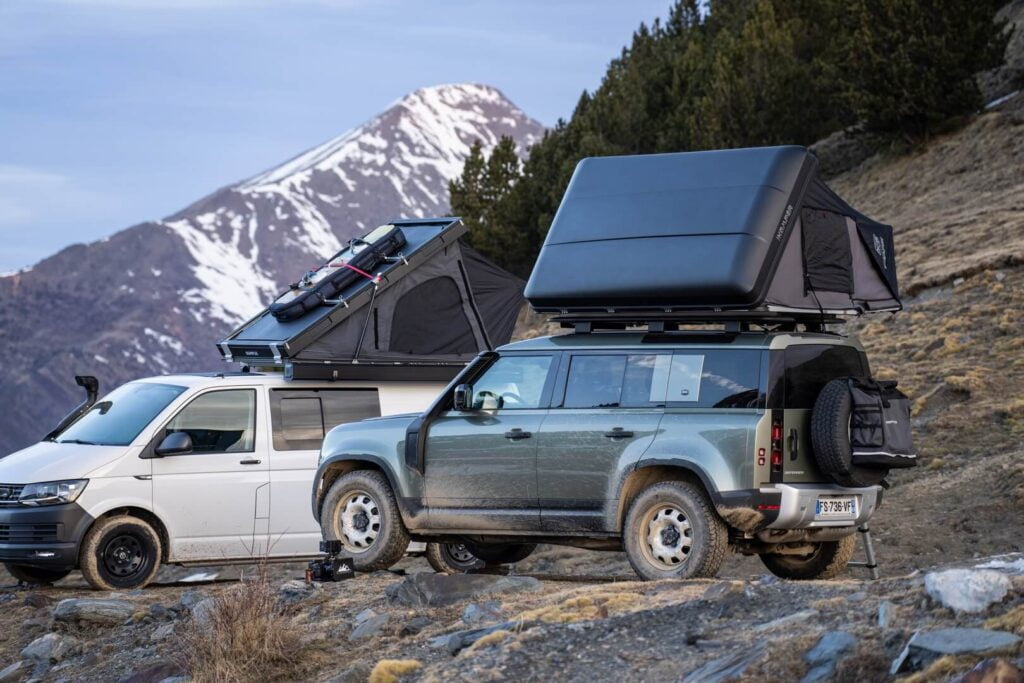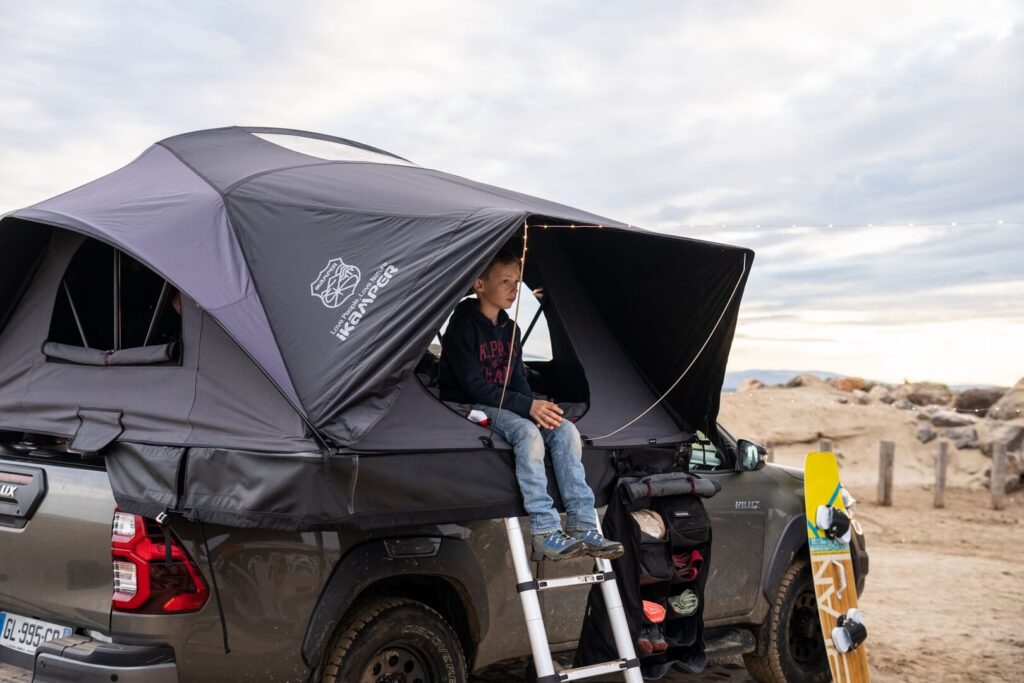Content of the page
For all those with adventure in their hearts and a thirst for freedom in their minds, we have a proposal for you. What could be more exciting than combining the comfort of your vehicle with the appeal of the great outdoors? That's exactly what a roof tent offers.
What is a roof tent?
If you don't already know, a roof tent is simply a tent that you can attach to the roof of your car. It unfolds in just a few minutes, giving you a cosy, protected space. Imagine opening your roof tent after a day's travel, slipping inside and admiring the scenery from the comfort of your perched cocoon.

The different types of hulls
There are two main types of shell for roof tents: soft shells and hard shells. Each has its own advantages and disadvantages.
Soft shells
Soft-shells are generally lighter and more affordable than hard-shells. They are often foldable, which means they can be reduced to a compact size when not in use.
Advantages of flexible hulls
- Lightweight : They are often lighter than rigid hulls, which can be beneficial for the vehicle's fuel efficiency.
- Cost : Flexible shells are more affordable, which can make the camping into a more accessible roof tent.
- Compact : Their ability to fold up makes them easy to store and transport.
Disadvantages of soft shells
- Installation: Flexible hulls can take a little longer to install and dismantle than rigid hulls.
- Protection : They may offer less resistance to the elements than rigid hulls.
Rigid hulls
Rigid hulls are stronger and more durable than flexible hulls. They often offer better protection against the elements, but are generally more expensive and heavier.
Advantages of rigid hulls
- Robustness : They are more durable and weather-resistant.
- Installation: Rigid hulls are easier and quicker to install and dismantle.
Disadvantages of rigid hulls
- Cost : They are more expensive than flexible hulls.
- Weight : Rigid hulls are heavier, which can affect the vehicle's fuel efficiency.
The advantages of a roof tent
There are many advantages to a roof tent. As well as the feeling of freedom, it offers :
- Unrivalled comfort : No more pebbles on your back or damp coming up from the ground, your roof tent gives you a sleeping space high up, protected from these inconveniences.
- Quick installation : It allows you to set up quickly, without having to look for a plot of land. flat. Tip: always try to park your vehicle in a stable, flat area for a better sleeping experience.
- Panoramic view : With the option of opening windows on several sides, you have an unrivalled view of the surrounding area.
- Safety : Sleeping high up can give you an extra sense of security compared with traditional camping on the ground.
The disadvantages of a roof tent
It's also important to be aware of the disadvantages of a roof tent. These include:
- Weight : Their weight can be a problem for some vehicles. Make sure you check the load capacity of your roof before buying a roof tent.
- Aerodynamics : They can affect the aerodynamics of your vehicle, increasing fuel consumption. It is advisable to drive at a moderate speed to minimise this effect.
- How to find us : For people with mobility problems, accessing a tent on the roof of the car can be a challenge.
For many people, however, these disadvantages are far outweighed by the freedom a roof tent offers.
How many people can sleep in a roof tent?
Most roof tents sleep two adults comfortably, but some are designed to accommodate up to four people. So whether you're on your own, a couple or a family, you can find the roof tent that's right for you.
Whether you're a solo camper, an adventurous duo or a family who loves the great outdoors, you should know that there are a variety of roof-top tents available on the market to suit all your camping needs. Take the iKamper tents, for example.
The model Skycamp 3.0 Mini is an excellent option for solo or couple campers. This tent is designed for two people and takes up very little space, making it ideal for small vehicles. What's more, its 6.5 cm thick foam mattress offers superior comfort with dimensions of 210 × 130 cm.

On the other hand, if you like travel with family or friends, the Skycamp 3.0 and the X-Cover 2.0 are ideal. These two models have a larger capacity and can accommodate three adults, or two adults and two children. The Skycamp 3.0 is an expandable hard-shell roof tent with an extension panel, while the X-Cover 2.0 is a hybrid roof tent with two crossbars for carrying extra equipment. What's more, both are equipped with foam mattresses, 6.5 cm for the Skycamp 3.0 and 7 cm for the X-Cover 2.0, measuring 210 × 196 cm and 227 × 175 cm respectively.
Whether you're a solo camper, an adventurous couple or a family who loves the great outdoors, there's a roof tent for you.
Focus on the iKamper roof tent brand
If you're looking for a quality roof tent, we strongly recommend you take a look at the iKamper brand. A pioneer in the field, iKamper focuses on technical innovation, comfort and the durability of its products. Their philosophy? To make escape and adventure accessible, without compromising comfort. For more information, visit their website https://ikamper.fr/.
Going on an adventure with a roof-tent means choosing freedom, independence and communion with nature. So, are you ready to set off into the unknown?



